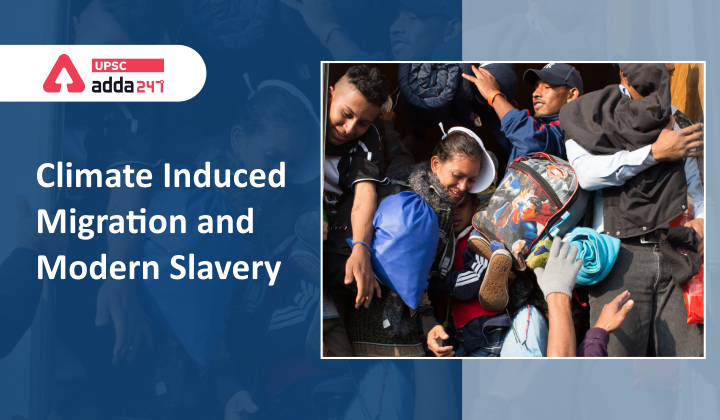Table of Contents
Relevance
- GS 2: Issues relating to poverty and hunger.
- GS 3: Conservation, environmental pollution and degradation.
Context
- Recently, International Institute for Environment and Development (IIED) and Anti-Slavery International has released a new report titled ‘Climate-Induced Migration and Modern Slavery’.
- The report has highlighted that climate change-induced extreme weather phenomenon put women, children and minorities at risk of modern slavery and human trafficking.
Key points
- According to the report, modern slavery — including debt bondage, bonded labour, early or forced marriage and human trafficking — converge with climate change, particularly climate-related forced displacement and migration.
- The report believed that climate change acts as a “stress multiplier” on existing factors such as poverty, inequality and conflict that drive modern slavery, with those uprooted from their homes especially at risk.
- The report describes situations where women and girls affected by climate change impacts find themselves prey to trafficking agents.
- The research includes case studies from West Africa and the coastal Sundarbans region of India and Bangladesh.
- It shows that more extreme weather and rising seas, which push people to move, are putting vulnerable groups at greater risk of human trafficking and modern slavery.
A case of Sunderban
- The Sunderban delta region witness intense, recurrent and sudden onset disasters, as well as slow onset ecological degradation that makes large areas uninhabitable.
- Coupled with above, rising sea levels, erratic rainfall, increased frequency of cyclones, tidal surges and floods, mean that millions of people across the Sundarbans are unable to work for most of the year.
- The disasters take a heavy toll on lives and livelihoods of the people living in the region.
Economic damage
- In 2009, Cyclone Aila caused widespread damage to lives and livelihoods.
- Similarly, in 2020, during Cyclone Amphan, embankment was breached and seawater entered the flood plains resulting in widespread displacement from homes and loss of livelihoods for more than two million people.
- Severe cyclone and flooding in Sundarbans delta had also reduced the land for agriculture, a major source of livelihood.
Social damage
- Such events made locals vulnerable to traffickers and drove them into forced labour. According to a report, human trafficking had increased following the tsunami in Indonesia in 2004.
- The annual flooding in Assam north-east India has forced women and girls into child slavery or forced marriage to make ends meet.
Recommendations to address the connection between climate change, migration and modern slavery
- Slavery as a mainstream policy issue should be incorporated into climate and development planning. Priority should be to recognise and the connection between climate-induced migration and modern slavery.
- Clear targets and actions need to be considered to end forced labour, modern slavery, human trafficking, and child labour in all its forms., in line with Sustainable Development Goal 8.7.
- Include affected communities in decision making while shaping policy interventions.
- Convergence between existing development and climate finance should be explored, to address the connection between climate-induced migration and slavery risks.
- There is a need to consider vulnerability to slavery in the framing of social protection initiatives and climate risk management, and create a rights-based approach for providing access to basic services and social safety nets to all vulnerable households.
- There is a need to identify hotspots based on layering climate risks with socio-economic, political and institutional risks, and to identify the migration pathways pursued by vulnerable communities during climate crises.
- Anticipatory action needs to be taken to move people to safety before disasters strike, including plans to relocate and resettle displaced communities.
MSP for All Rabi Crops Increased




 TSPSC Group 1 Question Paper 2024, Downl...
TSPSC Group 1 Question Paper 2024, Downl...
 TSPSC Group 1 Answer key 2024 Out, Downl...
TSPSC Group 1 Answer key 2024 Out, Downl...
 UPSC Prelims 2024 Question Paper, Downlo...
UPSC Prelims 2024 Question Paper, Downlo...





